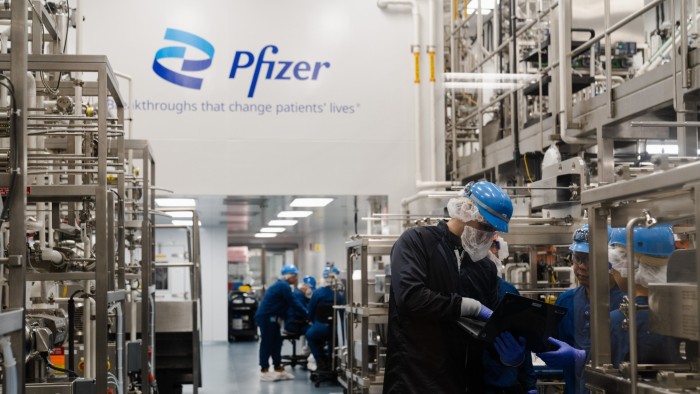Unlock the Editor’s Digest for free
Roula Khalaf, Editor of the FT, selects her favourite stories in this weekly newsletter.
Pfizer is closing in on a potential $7.3bn takeover of anti-obesity drug developer Metsera in what would be the biggest deal yet by a large pharmaceutical group trying to gain a foothold in the lucrative weight-loss drug market.
As part of the purchase agreement, Pfizer will pay Metsera $47.50 in cash per share and a further $22.50 if certain performance milestones are met, valuing the company at up to $7.3bn, according to two people familiar with the matter. The deal represents a sizeable premium to Metsera’s Friday closing price of $33.32 in New York.
The acquisition could be announced as early as Monday, providing it does not hit any last-minute snags, the people added. The deal offers Pfizer an experimental medicine with a shot at competing in the battle to develop the next-generation anti-obesity drug after the treatment it was developing in-house, known as danuglipron, flopped in clinical trials this year.
Metsera, which went public this year in one of the biggest biotech listings of 2025, is one of a host of companies researching next-generation weight-loss treatments aiming to dislodge the dominance of Eli Lilly’s Zepbound and Novo Nordisk’s Wegovy. Both of the existing treatments have been associated with side effects, such as muscle wastage.
Several large pharmaceutical groups showed interest in Metsera in a competitive auction process that went down to the wire, two people familiar with the situation said.
Pfizer and Metsera did not immediately respond to requests for comment.
Under the leadership of longtime chief executive Albert Bourla, Pfizer is seeking to boost the company’s share price. Its shares are down more than half from their 2021 peak during the Covid-19 pandemic, when the company produced a blockbuster vaccine. The stock closed at just over $24 on Friday, giving the drugmaker a market value of $136bn.
In 2023, Pfizer paid $43bn for cancer-focused biotech Seagen, betting its future on a promising new oncology treatment, known as antibody drug conjugates, but investors still remain unconvinced by the New York-based pharmaceutical company.
Including future cash payments if clinical trial goals are met, Pfizer’s deal to buy Metsera would mark the biggest deal by a major drugmaker buying an experimental weight-loss treatment. Analysts project the obesity drug market could be worth $95bn a year in peak sales.
Swiss pharma group Roche has previously been the most aggressive dealmaker, paying up $5.3bn to partner with Danish obesity biotech Zealand Pharma and up to $3.1bn to acquire Carmot Therapeutics.
Metsera’s lead drug MET-097i, which activates the GLP-1 receptor instead of blocking it like current treatments, resulted in 11.3 per cent body mass reduction after 12 weeks in a phase-two trial with limited side-effects. The company is also testing the drug as a long-acting, monthly injection, which could make it more convenient to use for patients.
The biotech is also researching medicine that harnesses amylin, another hormone, in early-stage trials, and further clinical data is expected by the end of this year. Scientists believe amylin could be an effective appetite suppressant without causing the muscle loss associated with the current GLP-1 treatments. Metsera also has a weight-loss pill in its pipeline.
In recent weeks, Eli Lilly and Novo Nordisk have released clinical data for next-generation pill versions of their obesity drugs.
First Appeared on
Source link




